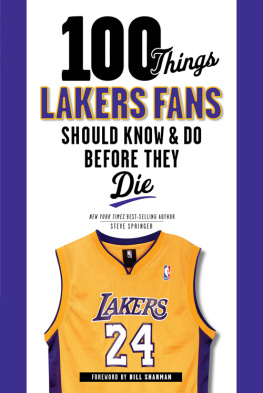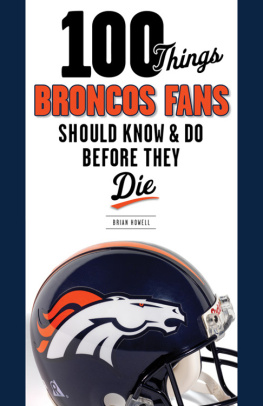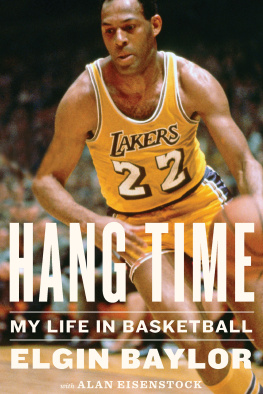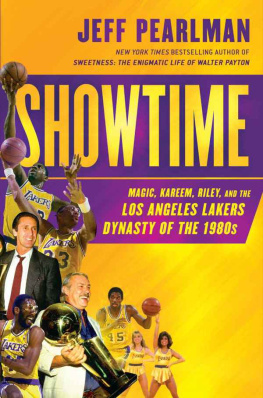Foreword by Bill Sharman
Its hard for me to believe that I have been in professional basketball for more than 60 years.
I spent my playing career with the Boston Celtics alongside such greats as Bob Cousy and Bill Russell. In those days, we played against the Minneapolis Lakers, who had the great center, George Mikan. We were extremely competitive and always looked forward to the challenge.
In my 10 years with the Celtics, we won four championships.
After my playing days were over, I went on to a coaching career and was lucky enough to win championships in the ABL with the Cleveland Pipers and the ABA with the Utah Stars.
In the meantime, my old archrivals, the Lakers, moved to Los Angeles. But even with superstars such as Jerry West, Elgin Baylor, and Wilt Chamberlain, they failed to win a championship, losing to the Celtics six times in the finals after coming to L.A., and once to the New York Knicks.
That is where my career with the Lakers began. The owner at the time, Jack Kent Cooke, hired me after the Stars championship season.
How ironic it was to have a Celtic come to Los Angeles to be the coach. I also brought along K.C. Jones (another Celtic) as my assistant.
It was a very exciting time, yet a challenging one with Elgin injured and Jerry and Wilt agingthough still superstars.
As a matter of fact, Cooke told me, Now Bill, I dont expect you to win anything this year. I just need you to help me rebuild my team.
At training camp that year, I implemented the shootaround. Some players didnt like it, but they still worked hard. It was clear from the beginning that Elgins injuries were affecting his ability to play. With his retirement, and the addition of Jim McMillian to the starting lineup, things started to change.
We started winningand winning. We won 33 games in a row, a record that still stands today.
We also won the first Los Angeles Lakers championship. It was an incredible and magical season.
Unfortunately, I damaged my vocal cords during that 197172 season, and have never fully regained my voice. It ended my coaching career, but I was fortunate enough to stay with the team, moving into the position of general manager.
Dr. Jerry Buss bought the Lakers in 1979, and I can honestly say that he has been the best owner that anyone could ever hope to be involved with. I have the greatest admiration and respect for him.
During my tenure as GM, I was lucky enough to have won the coin toss that gave the Lakers the No. 1 pick in the 1979 draft, a pick we used to select Earvin Magic Johnson.
There is a great story about that pivotal moment in team history that is not known to many people. Back then, the top selection was determined by a flip of the coin between the teams with the worst record in their respective conferences. The Chicago Bulls were last in the Eastern Conference at 3151 and the New Orleans Jazz finished worst in the Western Conference at 2656. But the Lakers had obtained the New Orleans draft pick as part of the compensation for the signing of Gail Goodrich by the Jazz.
Since New Orleans had a worse record than Chicago, we had the right to make the call on the toss, but Rod Thorn, then the Bulls general manager, phoned me to ask if he could do a promotion for his fans to pick heads or tails. Attendance was down at his arena and he thought this would spark interest in his team.
My first thought was, Absolutely not, because I felt heads was more positive and thats what I had planned to pick.
However, Rod had always been helpful to me and he really felt that the promotion would help his team, so, after thinking about it, I called him back and told him to go ahead with his plan.
Well, the Chicago fans picked heads, it came up tails, and history was made. Magic became a Laker and the Showtime era began. I dont even want to think about how it would have turned out if I had not gone along with Rods request.
I retired in 1988 because of the continuing problems with my voice, but I have been very fortunate to remain as a consultant for the Lakers since that time. I have worked alongside Jerry West and Mitch Kupchak, who went on to create the Kobe/Shaq era. Their accomplishments have been nothing less than spectacular.
This year marks my 40 th season with the Lakers, and I feel extremely grateful and blessed. It has been a remarkable journey, and I, along with all of the Lakers fans around the world, look forward to the next era for this extraordinary team.
Bill Sharman
8. The Announcement
It began as a routine medical test and ended as the greatest test of courage and resolve faced by one of the greatest players ever.
Magic Johnson was sitting in a Salt Lake City hotel room prior to a preseason game against the Jazz on October 25, 1991, when he learned via a phone call that he had a medical problem.
That alone didnt set off any alarms. After all, he had undergone major knee surgery a decade earlier and had collected all of the normal bumps and bruises that go along with a sport he had been playing nearly as long as he had been walking.
But Johnson was puzzled by the call, which came from team physician, Dr. Michael Mellman. Having looked at the results of a blood test Johnson had taken as part of a life-insurance physical tied to his new contract, Mellman was insisting Johnson return to L.A.
Immediately. Forget the game. Come home and come to my office now.
As he recalled in his book, My Life, some crazy ideas about all sorts of diseases flowed through Johnsons head as he gazed outside the window on the flight home.
Still, he wasnt prepared for what heard from Mellman a few hours later while sitting across from the doctor in his office, Johnsons agent, Lon Rosen, by his side.
Referring to the test results, Mellman, speaking in a somber but steady voice, told Johnson, You tested positive for HIV, the virus that causes AIDS.
AIDS? The word sent Johnson into shock. Back then, the disease was relatively new to the general public, its existence identified in the U.S. only about a decade earlier. Most people thought it just affected homosexual men.
Most also thought HIV always led to AIDS (acquired immune deficiency syndrome).
Thats what Johnson thought.
After hearing the stunning diagnosis, he thought first of his wife, Cookie, who was pregnant. Could she have contracted the disease? What about their unborn child? What about his career?
Mellman had no answers for him until additional tests were run.
In the meantime, Johnson faced what he said was the hardest thing he ever had to do: tell Cookie.
When he did, he started to say that he would understand if she wanted to leave him.
Before Johnson could even finish uttering the words, Cookie slapped him across the face. She didnt even want to discuss that option. She had waited to marry him since their undergraduate days at Michigan State, and they had finally taken the vows just over a month earlier.
Tests showed that neither Cookie nor the fetus had been affected by the HIV virus.
As for Johnson, he was told by Dr. David Ho, director of the Aaron Diamond AIDS Research Center in New York, that although Johnson had no AIDS-related diseases at that time, he shouldnt play basketball for at least the upcoming season.
Its a judgment call, Ho said, and my judgment is that you dont play.
Johnson decided to retire from the Lakers at age 32, the number he had worn on his jersey for so many years.
The press conference, announcing the end of his career, was held on November 7, 1991, at the Forum, the scene of so many moments of joy for Johnson.
Although the others around him wore looks of anguish and depression, Johnson remained upbeat as he spoke about his future beyond the Lakers.
I plan on going on living for a long time, bugging you guys like I always have, Johnson told the hastily assembled media as his words carried across the nation and around the world. So youll see me around. I plan on being with the Lakers and the league and going on with my life. Im going to be a happy man.
Next page




